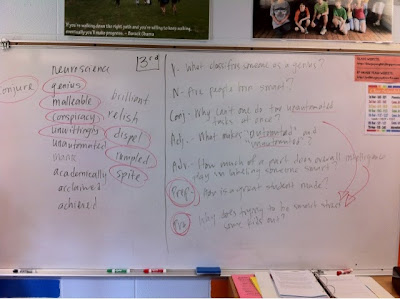This post is a result of the Parts of a Book assignment,
which students completed on Wednesday, and I scored over the weekend.
This is a situation problem. I
want to make sure I clarify the problems, which in my mind is two-fold.
The first problem I see is that students are not using their
notes as a valuable resource to answer questions, but I’m not sure why. To
clarify: the notes are not provided for the purpose of memorization—for
students to memorize and then regurgitate the information. The notes are provided
for the purpose of application—for students to use as a resource as they
discover new things about the books that they are reading or using on a regular
basis.
The second problem I see is that students are not using
their notes as a valuable resource to answer questions, because they don’t know
WHEN to use the notes. To this, I advise my students: if you have a question,
seek an answer. It’s the only way you’ll find answers. They won’t just come to
you. If you can’t recognize that you have a question, you will never find an
answer, because you will never go on the journey. And the journey is really,
really important.
When adults complete tax forms every year, we USE OUR NOTES.
We don’t memorize the rules. We can’t memorize the answers. We don’t just fill
in blanks because we think the IRS will be happy with answers that look
kinda/sorta right. We USE OUR NOTES—tax forms like W2s, 1098s, and 1099s, among
a bunch of others.
The skill of identifying the various parts of a book is
unimportant, in the grand scheme of things. And I think of the grand scheme of
things a lot when I consider the tasks I have the students complete, in order
to gain skills that will lead to a better life. Being able to identify the
parts of a book will help students correctly cite sources following MLA, APA,
and/or Turabian style guides. That’s the important, long-range, “school” need
for this skill. And if you’re not convinced that the skill is important, ask
anyone in college, or anyone working on publishing anything, how often they use
the various parts of a book or publication to follow style guides in order to
accurately reference sources.
But honestly, and I know these kids are 13 and 14 years old,
this is about a bigger picture. The trigger that indicates to a student that
they should access resources in order to solve their current problems needs to
be sensitive. If a kid doesn’t have lunch money, they shouldn’t sit at a table
and mope. There are ways we, as teachers and administrators, can help. A
trigger must go off, and resources must be accessed, for problems to be solved.
If a kid has a problem with another student, they shouldn’t just lower their
head and hope the whole thing blows over. A trigger must go off, and resources
must be accessed, for resolution to be achieved. And if a kid has a problem in
Math that they don’t know how to solve, they shouldn’t be OK with a wrong
answer or “their best” when “their best” only includes themselves. A trigger
must go off, and resources must be accessed, for the problem to be solved.
All of these goofy examples also help individuals learn
something—how to ask for help, that we can’t always solve our problems on our
own, that people really are helpful, and some specific Math skill. In the grand
scheme of things, aren’t those lessons really important?
Problems are, more often than we like, bigger than us. We
can’t solve everything on our own. We need help. We need resources. If kids
don’t realize that is normal, if kids don’t realize that’s necessary for
success, then they’re often going to experience varying levels of
disappointment and failure. And that’s not what I want.
So, we’re going to talk about triggers—like alarms—that help
us recognize when we need help solving a problem. And we’re going to talk about
resources—like notes, and textbooks, and books, and the internet, and, most
importantly, other people—that help us solve problems that are too big for us.
And we’re going to talk about levels of success—like how successful we can be
on our own, compared to how successful we can be when we use the resources at
our disposal. In the grand scheme of things, I think this stuff is pretty
important.
Let me know what you think.







